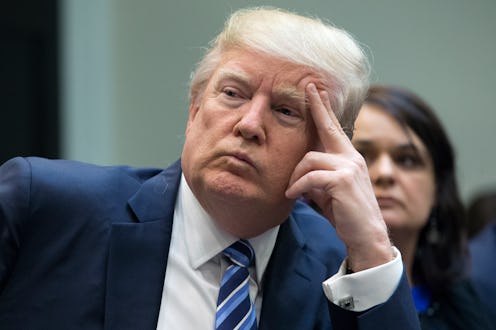News
7 Environmental Protections Trump Has Attacked

It's only been a couple of months with Donald Trump as president, but he's already managed to launch one of the most thorough attacks on federal environmental protections in American history. Trump's assault on environmental regulations isn't so much shocking as it is heartbreaking — for the most part, Trump is following through on campaign promises. However, that doesn't make it any less difficult to watch the federal protections of America's natural resources crumbling before your eyes.
Trump's environmental policy has been one of the most frustrating points of his short political career because it has stuck so thoroughly to the past precedent of the GOP. As an essentially independent candidate with strong personally appeal, Trump had the chance to reject former Republican environmental policies and push his jobs message through the lens of green energy. Instead, however, he chose to throw environmental protections under the bus in favor of perpetuating the old industry.
Trump's warpath for environmental deregulation is disappointing, to say the least, but so far, his actions are all traceable and reversible by the next president. That's why holding Trump accountable for his actions and working to elect a more progressive leader is so important — as soon as a president who is committed to environmental protections is in office, they can get to work reversing these seven attacks on the planet.
Appointing Scott Pruitt As EPA Chief
The single most dangerous thing Trump has done for the environment so far is appoint Scott Pruitt to head the Environmental Protection Agency, despite the fact that he's currently suing the very agency and has received more than $300,000 in campaign contributions from the oil and gas industry since 2002. With a like-minded ally heading the EPA, Trump can accomplish even more of his anti-environmental agenda in a short time span.
Slashing The Great Lakes Budget
Trump's preliminary federal budget would cut funding for the Great Lakes Restoration Initiative by 97 percent, which, according to the AP, has received only $200 million since 2011 (that equates to about 0.0009 percent of the total federal budget in the last six fiscal years). Yet still, this is what's on Trump's chopping block.
Generally Wrecking The EPA Budget
Trump's proposed slashing of the EPA budget by at least one-quarter isn't likely to meet much objection from Pruitt, potentially leaving hundreds without a job and the country's natural resources without an effective legal advocate.
Reviewing Auto Emissions Rules
Trump is also looking to change the fuel economy standards on American-made cars, most likely relaxing them and thereby allowing more air pollution. USA Today reported that the review is "likely to be cheered by U.S. auto makers," which probably means it won't be great for the American people.
Repealing The WOTUS Rule
Trump also signed an executive order ordering the federal government to kill the Waters of the United States (WOTUS) rule, which protects the nation's rivers, streams, and lakes from reaching dangerous pollution levels. According to Politico, conservation groups say the repeal could leave 60 percent of U.S. stream miles and 20 million acres of wetlands unprotected and vulnerable to development or pollution.
Killing The Stream Protection Rule
Trump killed this Obama rule that prevented coal miners from dumping their industrial residue into streams that were used for drinking water, because apparently that's not important.
Dropping Climate Change From Environmental Reviews
Trump is set to sign another executive order that would direct the entire federal government to reconsider the "social cost of carbon" metric that's used to calculate how much economic damage would come from climate change. This is terrifying because it's a serious factor in undertaking projects, and it seems like the Trump administration just wants to ignore it.
Environmental deregulation is one of the biggest reasons to fight back against Trump, because it doesn't just concern this generation but those who come after it. The government has the responsibility to provide for the nature's future security, and making sure there are still clean rivers and air is an essential part of that.